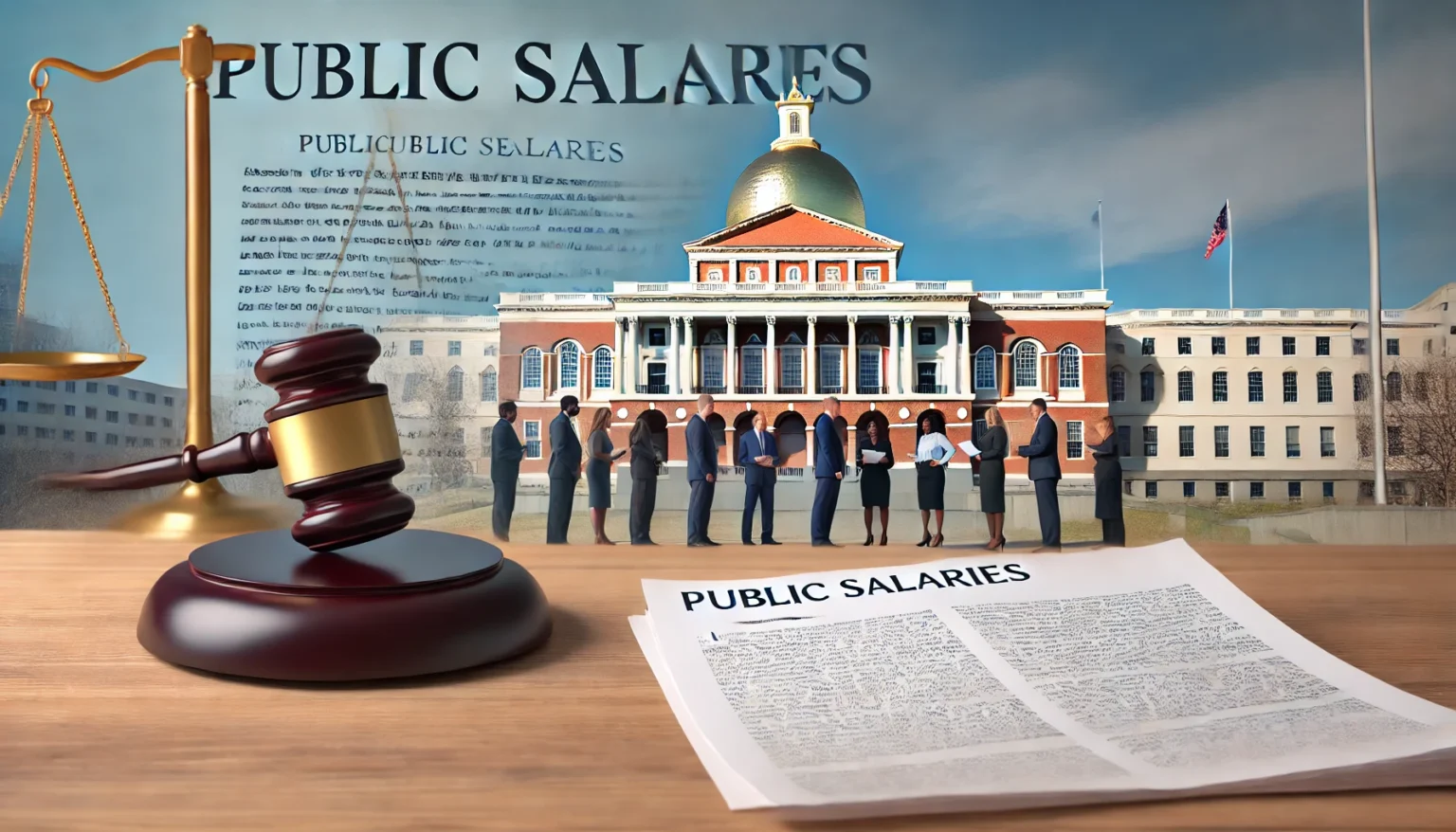A lawsuit for public salaries in Massachusetts has recently captured attention, highlighting the complex relationship between public sector compensation and legal challenges. These lawsuits often arise when employees believe their pay has been unfairly adjusted or withheld, or when discrepancies in salary distributions occur.
In Massachusetts, where public sector jobs represent a significant portion of the workforce, the implications of these lawsuits are wide-reaching. Lawsuits for public salaries in Massachusetts can potentially affect not just the employees involved, but also the state’s budget and public services.
The legal landscape surrounding these cases is influenced by both state and federal laws. A lawsuit for public salaries in Massachusetts often brings up questions of equity, contractual obligations, and the legal rights of government employees.
What is a Lawsuit for Public Salaries in Massachusetts?
A lawsuit for public salaries in Massachusetts arises when public employees file legal action for unpaid or disputed wages. These employees may include teachers, police officers, or state workers who claim that the state or local government has failed to provide the agreed-upon compensation.
Public employees often file lawsuits when they believe their salary does not reflect the terms of their contract or relevant laws. This includes unpaid overtime, missed raises, or discrepancies in salary increases.
The legal process begins with employees filing a complaint against their employer, typically the state or municipal government. They must prove that the government violated wage laws or contractual agreements.
These lawsuits often involve disputes related to overtime pay, benefits, or the application of collective bargaining agreements. Public sector employees may also seek compensation for work they performed outside of their regular hours.
If a lawsuit is successful, the public entity may be required to pay back wages, adjust future salary payments, or implement new wage policies. Such legal actions may also bring about broader reforms to salary administration in Massachusetts.
Recent Lawsuit for Public Salaries in Massachusetts: Key Facts
A recent lawsuit for public salaries in Massachusetts involves several state employees who claim they were not compensated correctly for overtime hours worked. The employees allege that their overtime pay was either miscalculated or withheld entirely.
The lawsuit, which includes workers from various state-run departments, seeks compensation for unpaid overtime and demands systemic changes to payroll processes. Key facts from the case include:
- The plaintiffs worked in various public sectors, such as transportation and public health.
- Evidence suggests the state’s payroll system mismanaged overtime claims over a prolonged period.
- The plaintiffs claim that they worked substantial hours but were not paid according to the state’s wage laws.
A settlement or court decision could have far-reaching effects on how the state handles employee wages. If the employees win, they may receive substantial back pay for overtime work. Below is a table of key data from the case:
| Department | Number of Employees | Total Overtime Claims | Total Alleged Unpaid Overtime ($) |
| Department of Transportation | 50 | 500 hours | $40,000 |
| Public Health | 30 | 450 hours | $35,000 |
| Law Enforcement | 20 | 300 hours | $25,000 |
If the case succeeds, it could prompt similar claims from other state employees, leading to a larger financial payout.
Legal Implications of a Lawsuit for Public Salaries in Massachusetts
A lawsuit for public salaries in Massachusetts can have wide-ranging legal implications for both public employees and the state government. The primary legal concern is whether the state has complied with labor laws that govern wage payments, including overtime and minimum wage laws.
If the lawsuit proves successful, the state may be required to pay back wages, and it could also face penalties for non-compliance with wage laws. This could set a precedent for future cases where public employees seek compensation.
Public sector employees are protected by laws such as the Fair Labor Standards Act (FLSA) and Massachusetts state wage laws, which regulate how employees should be compensated. Violations of these laws could result in legal actions not just against the state, but potentially individual officials or departments.
Another significant legal implication is the potential for changes in state payroll processes. Massachusetts may need to overhaul its payroll systems and provide better oversight to ensure compliance with wage laws.
Finally, the outcomes of such lawsuits could prompt legislative changes. If the courts find widespread issues in salary management, it may lead to reforms aimed at preventing future violations and improving compensation practices.
The History Behind Lawsuits for Public Salaries in Massachusetts
The history of Lawsuit for Public Salaries in Massachusetts dates back several decades. Disputes over public sector wages have been a point of contention since the early 20th century when public employees first began organizing to secure fair compensation.
In the 1970s and 1980s, Massachusetts saw a significant rise in public sector labor disputes, many of which resulted in lawsuits related to salary raises, benefits, and collective bargaining agreements. During this time, Massachusetts workers demanded better pay in light of inflation and rising living costs.
The 1990s saw a shift in the focus of lawsuits, with many workers filing claims related to unpaid overtime and discrepancies in salary increases. Public sector workers, particularly in education and law enforcement, argued that their pay did not meet agreed-upon terms.
In the early 2000s, the state made efforts to modernize salary management processes, but this did not eliminate disputes. In fact, new issues arose regarding the misclassification of employees, where workers were not compensated for overtime due to improper job classifications.
Today, lawsuits for public salaries in Massachusetts continue to reflect tensions between government budget constraints and the rights of public employees. These cases have become an important part of the state’s labor history.
How Lawsuit for Public Salaries in Massachusetts Can Affect State Budget
A lawsuit for public salaries in Massachusetts can have significant implications for the state’s budget. When lawsuits are filed over wage discrepancies, the state may face considerable financial obligations in the form of back pay, penalties, and settlements.
If the lawsuit involves numerous workers, the financial impact can be substantial. The state may be forced to divert funds from other important services to cover these costs, potentially affecting public health, education, and infrastructure.
For instance, if the case involves overtime pay, the state may need to reimburse workers for years of unpaid overtime. This could result in millions of dollars in back payments, which would strain the state’s fiscal resources.
Moreover, legal fees and administrative costs related to handling these lawsuits further burden the state budget. Resources allocated for legal defense and compliance might require reallocation from other departments, causing delays in other public projects or services.
Table: Impact of Public Salary Lawsuits on the State Budget
| Department Affected | Estimated Financial Impact ($) | Type of Dispute |
| Public Health | 3,000,000 | Unpaid overtime |
| Law Enforcement | 1,500,000 | Wage discrepancies |
| Education | 2,000,000 | Collective bargaining issue |
If such lawsuits lead to widespread reforms, the state may also need to invest in new payroll systems or compliance processes, which could further strain the budget in the short term.
Overview of Massachusetts’ Public Salary Regulations
Massachusetts has a well-defined set of regulations regarding public salaries. These regulations are designed to ensure fair compensation for public sector employees, particularly in terms of base salaries, overtime pay, and benefits.
The Lawsuit for Public Salaries in Massachusetts Wage Act requires that employees, including public sector workers, receive at least the state’s minimum wage and be paid for overtime worked beyond 40 hours a week. Failure to comply with these regulations can result in lawsuits for unpaid wages or overtime.
Additionally, public employees in Massachusetts are often part of collective bargaining agreements, negotiated by unions. These agreements govern salary schedules, raises, and other employment conditions, ensuring that pay rates are equitable across various sectors.
One of the critical components of Massachusetts’ salary regulations is transparency. Public salary information is accessible to the public, and employees can verify their compensation. This helps avoid disputes related to pay discrepancies and ensures that salary systems are fair and accountable.
The regulations also cover benefits such as pensions, health insurance, and sick leave. These benefits are an essential part of the total compensation package for public employees, and disputes often arise when these benefits are not properly administered.
Legal Precedents Influencing Lawsuits for Public Salaries in Massachusetts
Legal precedents significantly influence lawsuits for public salaries in Massachusetts. Past cases provide a framework for understanding how similar disputes are likely to be resolved in court. These precedents are often based on interpretations of wage laws and collective bargaining agreements.
One of the most notable precedents involves the Fair Labor Standards Act (FLSA), which mandates that employees be paid at least time-and-a-half for overtime hours worked. Many public salary lawsuits in Massachusetts refer to this law when employees claim they are owed additional compensation for overtime work.
In addition to federal laws, Massachusetts courts have referred to state-specific legal rulings, especially when it comes to enforcing collective bargaining agreements. Cases in which unions have sued the state for not adhering to negotiated terms have set important legal standards.
Another precedent comes from cases that focus on wage parity. Massachusetts courts have ruled in favor of employees in cases where it was proven that pay differences existed among workers performing similar tasks, leading to more stringent standards for equitable pay.
The influence of these legal precedents ensures that public sector workers are better protected under the law, and any failure to adhere to wage and overtime rules can result in significant consequences for state employers.
Who is Affected by Lawsuits for Public Salaries in Massachusetts?
A lawsuit for public salaries in Massachusetts can affect a broad range of individuals, primarily public sector employees. Those who work in government-run agencies, municipalities, or state-funded organizations may file lawsuits if they believe their pay has been incorrectly handled.
Employees in positions that often require overtime, such as police officers, fire fighters, and healthcare workers, are frequently affected by these disputes. They are often the first to file lawsuits claiming that they were not paid for hours worked beyond the standard 40-hour workweek.
Public school teachers and administrators are also vulnerable to salary-related issues. Discrepancies in contract terms, missed pay raises or disagreements over benefits can lead to legal action from these workers, especially if their collective bargaining agreements are violated.
Moreover, lower-income employees in public sector jobs are particularly vulnerable. Wage discrepancies are more likely to affect workers in entry-level positions, where salary rates may not be aligned with state law or collective agreements.
Even though the immediate impact is on public employees, the effects extend to taxpayers and local governments. If large-scale payouts occur, taxpayers may bear the cost, leading to increased taxes or reductions in government services.
Potential Outcomes of a Lawsuit for Public Salaries in Massachusetts
The potential outcomes of a lawsuit for public salaries in Massachusetts can vary depending on the specifics of the case, but there are common results that typically occur. If the lawsuit is successful, public employees may receive back pay for unpaid wages or overtime, potentially spanning several years.
One possible outcome is a settlement between the plaintiffs (the employees) and the defendant (the state or local government). This often happens before a case reaches trial and involves an agreement where the state compensates workers without admitting fault. Settlements are typically quicker and less costly for the state, but they still represent a financial burden.
Another potential outcome is a court ruling in favor of the plaintiffs. In this case, the state would be required to compensate workers for the full amount of unpaid wages or overtime, along with potential damages or interest. This outcome can result in significant financial penalties for the state.
Conversely, if the court rules in favor of the state or employer, the workers may not receive any compensation. This would set a legal precedent, potentially discouraging future lawsuits unless new grounds for legal action emerge.
Finally, policy changes can also result from these lawsuits. If the state loses or faces repeated legal challenges, it may implement new payroll processes or wage management systems to prevent future violations, helping improve salary practices moving forward.
The Role of Unions in Lawsuits for Public Salaries in Massachusetts
Unions play a pivotal role in Lawsuit for Public Salaries in Massachusetts. They represent the collective interests of workers and often initiate legal action on behalf of their members when disputes arise over wages, overtime, or contract violations.
One of the primary roles of unions is to negotiate collective bargaining agreements that set salary rates, overtime policies, and benefits for public employees. If these agreements are violated, unions are the first line of defense, ensuring that their members receive fair compensation.
In cases of wage disputes, unions provide legal support and resources to employees, helping them navigate the legal process. This includes offering representation in court and covering legal fees, which makes it easier for workers to pursue claims against the state or local government.
Furthermore, unions are influential in shaping public opinion and policy on wage-related issues. By rallying public support, unions can apply pressure on lawmakers to enact reforms that address the root causes of salary disputes and prevent future legal challenges.
Unions also advocate for better compensation policies that ensure fairness and transparency in public sector salaries. This can lead to reforms in the way salaries and benefits are administered, reducing the likelihood of disputes and lawsuits.
How a Lawsuit for Public Salaries Could Impact Public Services in Massachusetts
A lawsuit for public salaries in Massachusetts can have broad-reaching consequences, especially for public services. When significant settlements or judgments occur, state and local governments may need to reallocate funds, which could impact the delivery of essential services.
One immediate effect is that funds may be diverted from public services to cover the financial obligations of a lawsuit. This could result in budget cuts to programs such as education, healthcare, or public safety, potentially reducing the quality of services provided to the community.
Furthermore, long-term financial strain on the state’s budget could result from multiple lawsuits. If the state faces frequent legal challenges over salary issues, it may need to adjust its budget priorities, which could lead to reductions in services or delays in funding for infrastructure projects.
Another impact could be a shift in government priorities to prevent future legal claims. The state may decide to invest more in administrative processes, compliance systems, or new payroll technologies to prevent errors that lead to lawsuits. While this could improve salary management, it would also require reallocation of funds.
In some cases, lawsuits for public salaries can disrupt government workforce morale, leading to employee dissatisfaction and a decrease in productivity. If employees feel that their wages are not being handled fairly, it could affect their motivation and performance in their roles, potentially impacting service delivery.
The Process of Filing a Lawsuit for Public Salaries in Massachusetts
The process of filing a lawsuit for public salaries in Massachusetts follows several legal steps that public employees must take to ensure their claims are properly addressed. The first step is identifying the legal issue, whether it’s unpaid overtime, incorrect wage calculations, or a violation of a collective bargaining agreement.
Once the issue is identified, the next step is attempting to resolve the dispute through internal channels. Employees often file complaints with their employer’s human resources or payroll department to attempt to rectify the issue before pursuing legal action.
If internal resolutions fail, employees can then file a formal complaint in court or with a state agency like the Massachusetts Department of Labor Standards (DLS). This involves gathering evidence, including pay records, overtime logs, and any relevant communications that support their claim.
A lawsuit is typically filed in civil court, where both sides present their case. If the case proceeds to trial, both the plaintiffs and the state will present their arguments, and a judge will make a ruling based on the evidence and applicable laws.
If a lawsuit is successful, the court may order the state or local government to pay back wages, and there may also be additional penalties or interest. Alternatively, the case may be settled outside of court, which could result in an agreement between the employee and the employer without a trial.
Future Outlook for Lawsuits for Public Salaries in Massachusetts
The future outlook for Lawsuit for Public Salaries in Massachusetts remains uncertain but could evolve based on ongoing legal, economic, and political factors. With increasing attention on wage equity and fair compensation, the frequency of such lawsuits may rise as workers seek to hold the state accountable for wage discrepancies.
There is also a growing focus on pay equity and fairness. Future lawsuits may focus not only on unpaid overtime but also on ensuring that public sector workers are compensated equally for similar work, regardless of gender, race, or other factors. This could lead to an increase in litigation regarding wage disparities.
As public sector budgets continue to face constraints, the state may enact reforms to prevent wage disputes. Implementing better payroll systems, increasing transparency, and ensuring compliance with both state and federal labor laws could reduce the likelihood of future lawsuits.
On the other hand, rising costs of living and inflation could increase pressure on public sector workers to file lawsuits for salary increases or cost-of-living adjustments. Workers may be more inclined to challenge the state if they feel that their wages are not keeping up with economic changes.
In conclusion, while reforms may help reduce disputes, lawsuits over public salaries will likely continue to be a key issue in Massachusetts, particularly as new generations of workers demand better pay and fairer working conditions.
Conclusion
The lawsuit for Public Salaries in Massachusetts highlights the ongoing challenges of ensuring fair compensation for public employees. As state workers continue to fight for their rights, these legal battles serve as a reminder of the importance of transparent and accurate payroll management systems.
While such lawsuits can place financial pressure on the state, they also create opportunities for reform. Successful cases often lead to improved policies, better oversight of payroll systems, and increased awareness about the need for equitable wage practices.
However, the outcome of these cases is not always guaranteed, and the resolution of salary disputes can have broad implications for both public employees and taxpayers. As public services face potential cuts to accommodate legal settlements, it becomes clear that maintaining a balanced approach to employee compensation and fiscal responsibility is essential.




